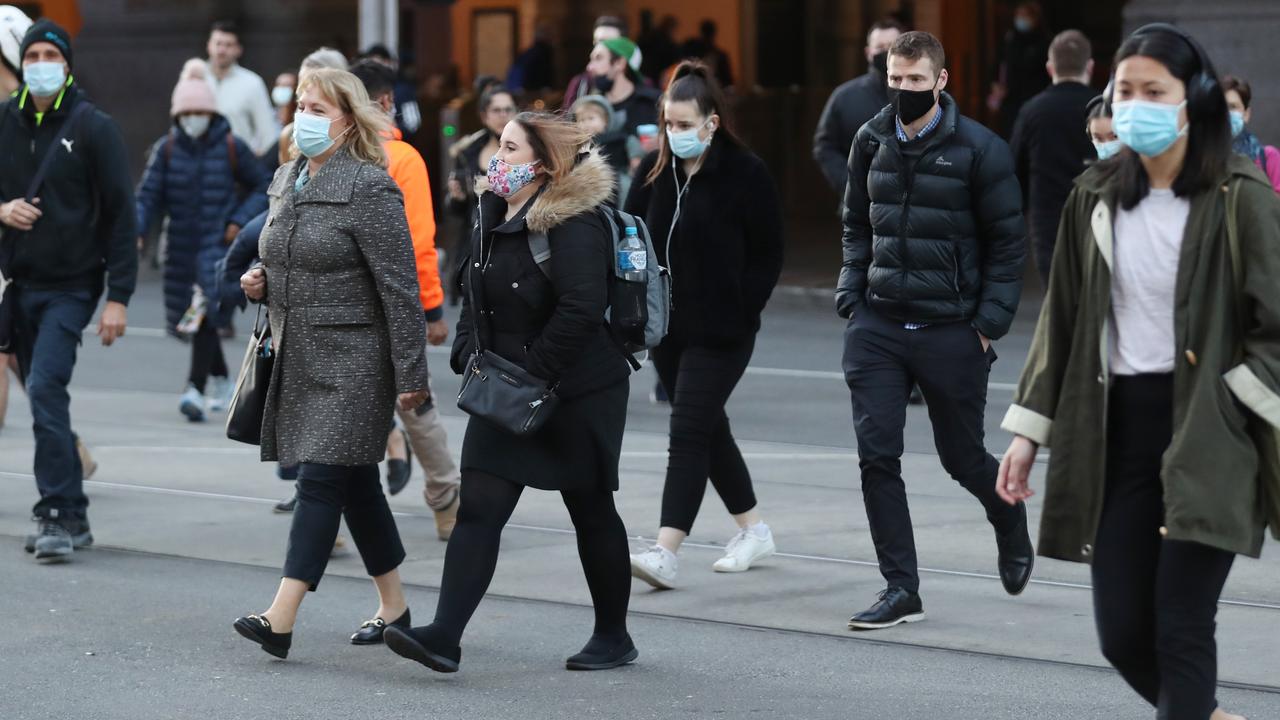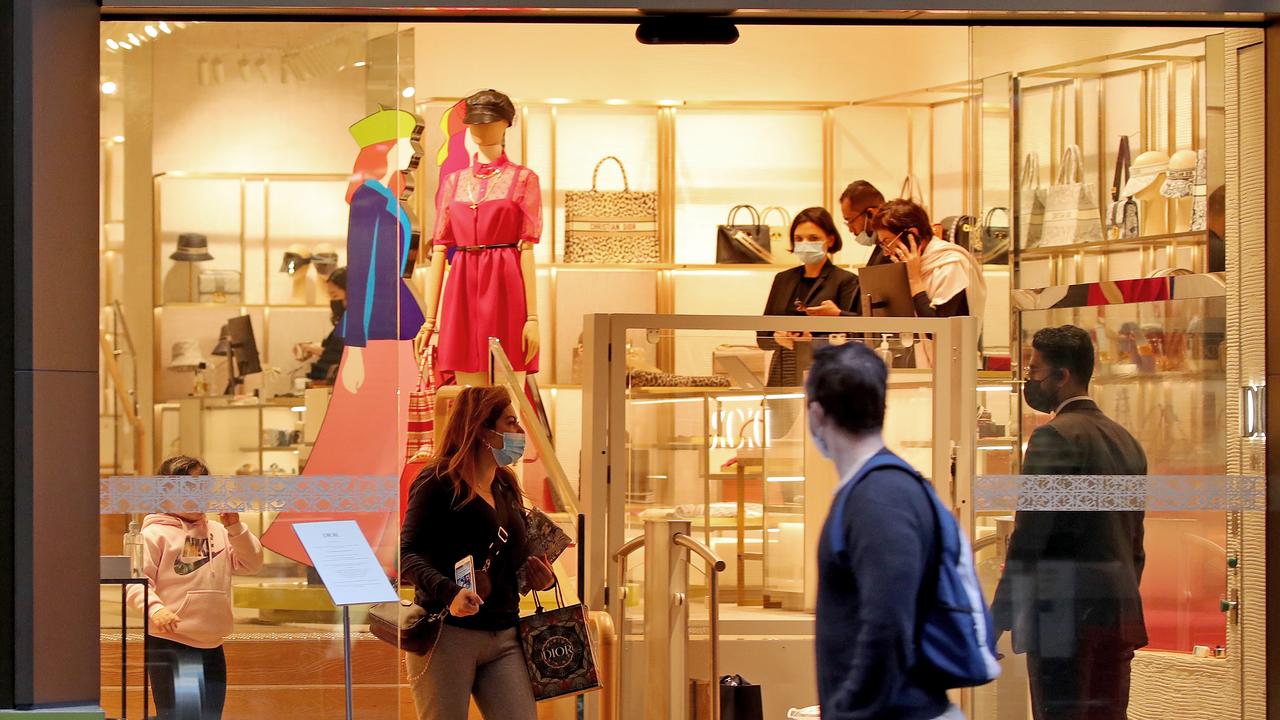‘Frightening’ reason why life in Australia won’t be able to go back to normal after Delta outbreaks
Life won’t be able to go back to normal after the latest Delta outbreaks, one expert warns, as she points to one ‘frightening’ situation.

The emergence of the Delta variant in Australia is rewriting the rules for how the country deals with outbreaks and one expert says we may not be able to go back to what life was like pre-lockdown.
The rapid spread of cases has put Greater Sydney in lockdown for only the second time since this pandemic began, while Victoria is now in its fifth shutdown.
Queensland this week also extended its mask rules for those in the southeast of the state, while South Australia moved to “pre-emptive” restrictions on Thursday night despite having no cases.
“We don’t want lockdowns in South Australia so we are taking some pre-emptive action to make sure we can keep our state safe and our economy strong,” SA Premier Steven Marshall said.
SA’s rules include the use of masks in certain indoor settings, density limits and certain restrictions if people want to have a gathering of more than 50 people.
Melbourne University clinical epidemiologist Professor Nancy Baxter said recent cases, particularly in Melbourne, highlighted how highly infectious Delta was.
Four days after two removalists were found to be positive (and less than week after they travelled to Melbourne from Sydney), it emerged the infection had already been passed to the family they moved, others in the apartment building, family and friends of those in the building, family of those friends, and other secondary contacts.
The outbreak has grown to 43 cases including at least four people who became infected through “fleeting contact” while at an AFL game at the Melbourne Cricket Ground (MCG).
“It’s just so hard to get on top of Delta,” Prof Baxter said.
RELATED: Backlash against non-essential retail stores open in Sydney

“Probably by the time they identify the first case, the contacts of their contacts would already be positive.
“Some people will turn positive in as little as a day (compared to up to five days for the original strain of Covid-19) and have given it to the next ring of contacts before they can identify them.
“So it’s very difficult to get on top of it without the so-called circuit breaker lockdown that allows contact tracers more time to do their job.”
She said the short, sharp lockdown made contact tracing easier because it meant that a positive case may only have four contacts, compared to 40 contacts normally.
Patience with lockdowns appears to be wearing thin in some places like Victoria, which is currently enduring its fifth shutdown. Protesters took to the streets on Thursday night after the most recent five-day lockdown was announced.
However, without a substantial amount of the population vaccinated authorities don’t have much choice as lockdown is the only way they are able to stop the spread of Delta — as NSW is proving.
“With Delta, if we don’t do something to manage it right now, the impact of Covid is going to be at least as bad as the UK, maybe even worse because it is so infectious,” Prof Baxter said.
“So the ‘let it rip’ people — all they need to do is look at India if you want to see what ‘let it rip’ with Delta is going to be.”
RELATED: 270 Sydney suburbs on high alert

We can’t go back to pre-lockdown life
Prof Baxter warns the highly infectious nature of the Delta variant means Australians will likely have to live life with some restrictions until enough of the population is vaccinated.
“It was great two months go, we were all going out and the streets were crowded,” Prof Baxter said.
“It was good before the forced lockdown but I don’t think we can go back to that.
“We need to live as if Covid exists until we’re vaccinated, otherwise we’ll be in lockdown after lockdown after lockdown.”
Prof Baxter said that unless hotel quarantine arrangements were changed, Australia would have to keep some restrictions in place.
Data has shown breaches of quarantine have increased this year, with about 20 occurring this year, out of a total of around 30 since the system was established last year, The Guardian reported.
“If we continue to have international travellers in quarantine that is not fit-for-purpose, we will have ongoing potential risk of transmission,” she said.
“Given the number of ongoing breaches, if we continue the current path we will need to have ongoing restrictions of our activities to mitigate risk of spread.
“We can’t go on as we are.”
RELATED: Dan Andrews’ subtle sledge at Gladys Berejiklian
Prof Baxter said without proper quarantine, there would need to be restrictions on congregating and participating in higher risk activities.
This could include ongoing limits on indoor dining, gyms, funerals and weddings. There may also have to be limits on crowds gathering in places like the MCG.
“If we don’t reduce the risk by reducing international travel or ensuring fit-for-purpose quarantine, we have to act like we are always at risk,” she said.
Prof Baxter’s comments echo those made by infectious diseases expert Professor Peter Collignon of Australian National University, who warned last month that residents may have to live with ongoing restrictions during winter while the virus is more active.
This could include restrictions on crowds at football matches and requiring people to be seated while drinking at bars.
“My view is we need restrictions even in areas that don’t have outbreaks in winter,” he told news.com.au.
“For the next few months, because it is winter and we are not vaccinated, we need to wear more restrictions for a while.”
‘Frightening’ situation we’re in
Australia has already announced that it will halve its number of overseas arrivals but Prof Baxter said if those still entering the country couldn’t be housed at the purpose-built Howard Springs facility in the Northern Territory, then they should be separated into low-risk and high-risk travellers.
“I know that’s a logistical nightmare but we really shouldn’t have people in the CBDs of our cities that are high risk travellers,” she said.
Prof Baxter pointed out authorities had still not been able to find how a Victorian family who went camping in NSW, managed to get the Delta strain last month. The family’s infection was genomically linked to a case in the state’s hotel quarantine but it’s still unclear they how they got the virus.
“They’ve ever been able to find the connection,” she said.
“I find that very frightening.
“Before you could say, this was done wrong, or we can change that, but here we can’t find what went wrong, we can’t even find the intermediary.
“Maybe even more frightening is nothing may have gone wrong, and this is ‘as good as it gets’ in hotel quarantine. Delta is so infectious that ‘as good as it gets’ may not be good enough.”




